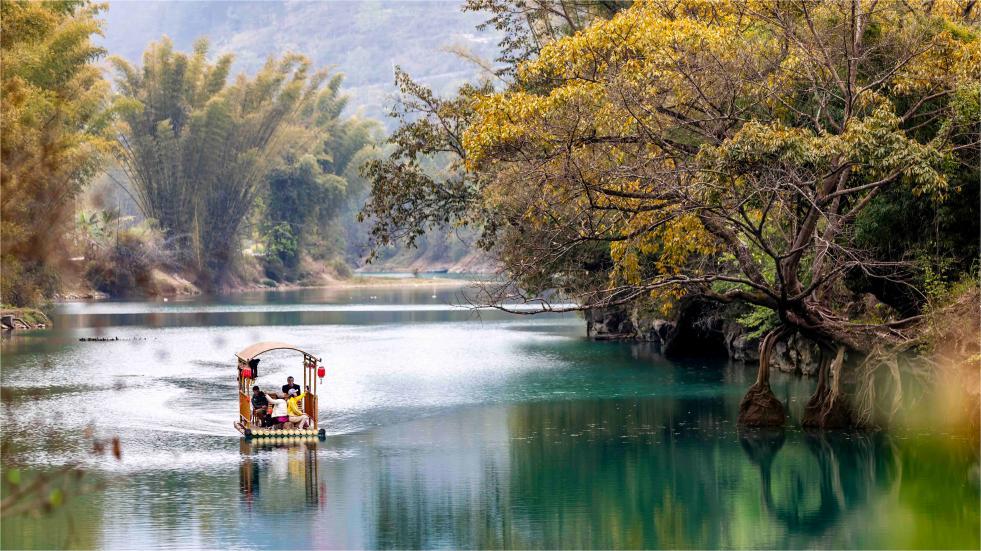Feature: A villager's devotion to bird conservation at north China wetland
SHIJIAZHUANG, March 13 (Xinhua) -- When Zhou Longshan started filming birds 10 years ago at Baiyangdian Lake, a major wetland in northern China, he just wanted to record his favorite species -- egrets.
Then things snowballed. In the following years, the teacher became a bird watcher, a volunteer ranger at the lake, a shutterbug documenting over 110 bird species, and an educator popularizing bird-related knowledge among students.
"Sharing bird-protection knowledge with children can make them feel the beauty of their hometown and the importance of birds, and help them cultivate the habit of protecting birds from an early age," he said.
Zhou, 60, is a native of Xixiangyang Village, Anxin County, in the Xiong'an New Area of north China's Hebei Province.
Growing up in the village, a five-minute bike ride from Baiyangdian Lake, he has fond childhood memories associated with the wetland.
"When I was a child, the water in Baiyangdian was limpid. The fish and aquatic plants in the water could be seen clearly. And there were many lotus flowers as well as lotus roots," he said. "I often caught fish with my friends, rowed boats and drank the lake water when I was thirsty."
Between the 1960s and 1980s, however, Baiyangdian suffered severely from industrial pollution. Chemicals carried by sewage poisoned the water and lake beds, decimating the aquatic life. In the 1990s, the lake nearly dried up due to climate change.
When Zhou became a teacher at Xixiangyang Primary School in the 1990s, the stink from the lake could sometimes be smelled from his village. "The lake became stinking, the population and species of fish and birds decreased, and the locals were unwilling to go near the lake," he recalled.
Then, efforts were made to turn the tide and restore the lake to its former state of health. Since the Xiong'an New Area was established in 2017, Baiyangdian's rehabilitation and protection activities have improved greatly.
The local authorities took a series of measures to cope with the situation, such as pollution control, ecological water replenishment and ecological restoration, according to the ecology and environment bureau of the Xiong'an New Area.
Over time, Zhou's interest in birds continued to grow. In 2021, he was appointed as a bird observer by the natural resources bureau of Anxin County, responsible for conducting regular patrols and popularizing bird-related knowledge.
To monitor birds, Zhou would ride a bike to Baiyangdian almost every day before dawn, whatever the weather. He would record the birds appearing at the lake, along with their locations, where they fed and when they migrated, thus providing reference data for staff members of the natural resources bureau of Anxin County.
Although Zhou takes delight in the role, there are still many challenges. Sometimes, he has to navigate earth embankments on his bike. One summer day in 2021, he fell into a ditch with water more than a meter deep, resulting in water damage to his cellphone.
However, these difficult episodes have not undermined Zhou's love of birds. Over the years, he has taken more than 100,000 pictures recording the birds at Baiyangdian.
During his spare time, he reads books on China's birds, discusses with other bird enthusiasts and university professors, and updates his WeChat official account to introduce Baiyangdian to a wider audience.
According to the bureau of natural resources and planning of Xiong'an New Area, as of the end of February, 276 wild bird species have been spotted at Baiyangdian Lake, an increase of 70 since the establishment of the new area.
Tian Yongchang, who works at the natural resources bureau of Anxin County, said that nine avian habitats have been designated in the wetland to better protect the birds. Signs have also been erected and an intelligent habitat-monitoring system has been installed.
A mode of management that incorporates government departments, non-governmental associations and volunteers has also been adopted to mobilize more people to participate in bird-protection work, Tian said.
In 2018, Baer's pochards, a species under first-class national protection, were spotted at Baiyangdian for the first time. And in July 2022, the birds were observed brooding at the lake for the first time, meaning it has become a breeding area for the species.
"The birds at Baiyangdian are not only increasing in terms of population but also in terms of species. The appearance of rare birds signifies that the diversity and stability of Baiyangdian's ecosystem have been improved significantly," Tian said.
Additionally, since the establishment of the new area, the water quality in Baiyangdian has improved from Level V -- the lowest in China's five-tier water assessment system -- to Level III.
These days, Zhou's schedule is growing busier. In addition to his regular patrols near the lake, he is sometimes invited to local schools to give lectures, keeping students informed about birds and how to protect them.
Under his influence, his two grandsons have also developed a great interest in birds. On weekends, after finishing their homework, they watch birds with Zhou, and his elder grandson has become a keen amateur photographer.
Zhou will retire in April. "I will continue patrolling the lake and photographing the birds, to contribute to the protection of birds in my hometown," he said.
Photos
Related Stories
Copyright © 2024 People's Daily Online. All Rights Reserved.









